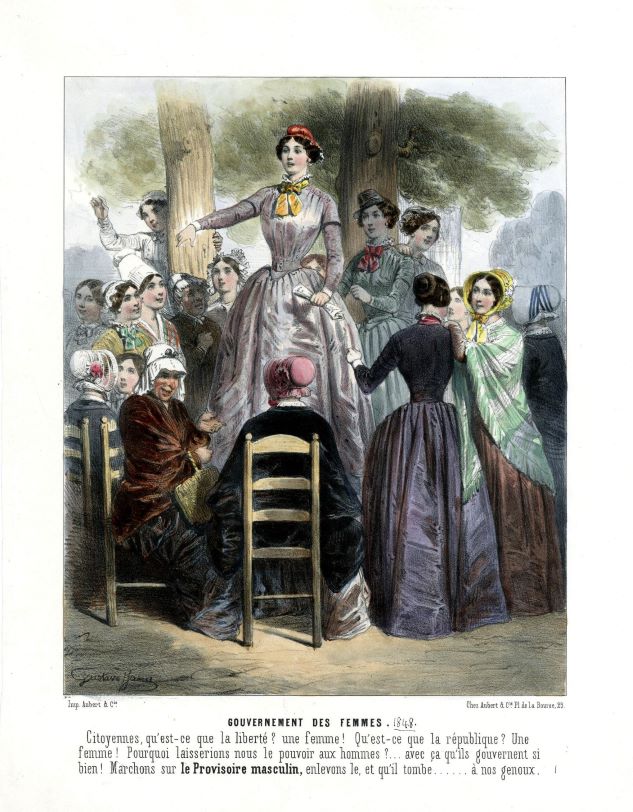Liberty Matters
Response

It was a pleasure to read these essays in honor of Women’s History Month, and I was particularly pleased to see lengthy discussions of Angelina and Sarah Grimke. My eye was caught by Elizabeth Amato’s consideration of their use of the story of Queen Esther and Purim. It’s a coincidence, I know, that the piece appeared on the OLL just as Purim arrived on our calendars and hamantaschen arrived in my kitchen. But the coincidence, I think, provides a useful reminder of the ways in which ancient stories provide inspiration and motivation for the important work of advocating for, seeking, and promoting the rights of women.
As an early modernist, I have long been fascinated by the space created for women’s voices in the tumultuous years of the 1650s and 60s in England. With sectarian religions seemingly cropping up overnight as a result of Cromwell’s lack of a declaration of a state religion after the execution of Charles I, there was suddenly increased cultural room not just for sects like Quakers, Ranters, Fifth Monarchists, and others, but for the voices of women to speak, write about, and publish those sectarian viewpoints. Even the Restoration--for all its language of a return to orderliness and peace--could not quiet the sectarians once they got started.
One of my personal heroes among these women is Margaret Fell who, along with her husband, George Fox, founded the Quakers in England. Fell was something of a tiger. When she was told that she could be arrested for continuing to host Quaker bible studies and meetings in her home, she responded:
I told them I should not deny my faith and principles for anything they could do unto me; and whilst it pleased the Lord to let me have a house, I would endeavour to worship him in it. So they caused the oath to be read, and tendered it unto me; and I refused it, telling them, I could not take any oath for conscience sake, Christ Jesus having forbid it. [Fell is then taken to jail and told she will be released if she will give up holding meetings] But I answered the judge that I rather chose prison for obeying God, than my liberty for obeying men contrary to my conscience.
And she and her husband had a marriage contract that was so radical (it actually allowed Fell to keep her own property after marriage!) that they had to appear in court to defend it.
It’s no surprise, then, to find that Fell--like the Grimkés--drew inspiration from, and found models for her own life in, the unruly, independent, and strong women depicted in the Hebrew Bible. In her best known work, Women's Speaking Justified, Fell turns, as did the Grimkés, to the figure of Queen Esther (whom she refers to as Hester) as an example of women standing up to tyrants.
And see what glorious Expressions Queen Hester used to comfort the People of God, which was the Church of God, as you may read in the Book of Hester, which caused Joy and Gladness of Heart among all the Jews, who prayed and worshipped the Lord in all places; who jeoparded her Life contrary to the King's Command, went and spoke to the King, in the Wisdom and Fear of the Lord, by which means she saved the Lives of the People of God; and righteous Mordecai did not forbid her speaking, but said, If she held her Peace, her and her Father's House should be destroyed. And herein, you blind Priests, are contrary to righteous Mordecai.
But my favorite thing about Fell is that she doesn’t take Esther just as a literary allusion. Fell actually takes her as a model for her own political behavior. She frequented Whitehall during the early years of Charles II’s reign, hand-delivering letter after letter and pamphlet after pamphlet to the King and his family and courtiers, in the hopes of obtaining better treatment and freer religious practice for Quakers in England. And Fell’s missives pulled no punches. A fairly typical passage from a letter to the King runs:
It is strongly on my heart once more to give thee warning to take care of these things, to take a little view of them betimes before it is too late. You have made an act against us, for what cause the Lord knows, we being harmless and innocent, and tender towards you, although our sufferings have been great; but since you have made a law, it is unreasonable you should exceed it in severity.
Fell’s bold insistence on equitable treatment and the assumption that women should be a part of the political and theological conversation of the time must have been an inspiration to the Grimkés who converted to Quakerism in the 1820s. I do not think it is far-fetched to suspect that they had read the work of Quakerism’s founder, Margaret Fell, and integrated some of her arguments and images--and her use of Queen Esther--into their own work.
Copyright and Fair Use Statement
“Liberty Matters” is the copyright of Liberty Fund, Inc. This material is put on line to further the educational goals of Liberty Fund, Inc. These essays and responses may be quoted and otherwise used under “fair use” provisions for educational and academic purposes. To reprint these essays in course booklets requires the prior permission of Liberty Fund, Inc. Please contact oll@libertyfund.org if you have any questions.